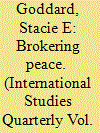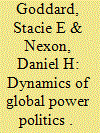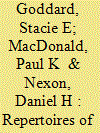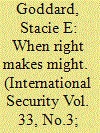|
|
|
Sort Order |
|
|
|
Items / Page
|
|
|
|
|
|
|
| Srl | Item |
| 1 |
ID:
118157


|
|
|
|
|
| Publication |
2012.
|
| Summary/Abstract |
After over 20 years of fighting in Northern Ireland, the Belfast Agreement of 1998 has successfully implemented a power-sharing agreement. Belfast was not the first attempt at a peaceful settlement; indeed, some scholars count as many as seven prior peace attempts in Northern Ireland, the most significant being the Sunningdale Agreement of 1973. Why was it that politicians successfully negotiated the peace in 1998, while these prior attempts failed? Drawing from social network theory, I argue that the Belfast Agreement succeeded, not because of a change of interests or disappearance of spoilers, but because of the presence of brokers at the bargaining table. Brokers, in particular, have the capacity to legitimate settlements-to frame settlements in such a way that they appear consistent with principles held by multiple coalitions. As a result, brokers are both more likely to build a winning coalition for a settlement, as well as marginalize spoilers who seek to undermine the peace.
|
|
|
|
|
|
|
|
|
|
|
|
|
|
|
|
| 2 |
ID:
145147


|
|
|
|
|
| Summary/Abstract |
We call for a research program focused on the dynamics of global power politics. Rather than link realpolitik to structural-realist theoretical frameworks or the putatively anarchical character of world politics, the program treats power politics as an object of analysis in its own right. It embraces debate over the nature of global power politics among scholars working with distinctive approaches. It sees the structural contexts of power politics as highly variable and often hierarchical in character. It attenuates ex ante commitments to the centrality of states in global politics. And it takes for granted that actors deploy multiple resources and modalities of power in their pursuit of influence. What binds this diverse research program together is its focus on realpolitik as the politics of collective mobilization in the context of the struggle for influence among political communities, broadly understood. Thus, the study of the dynamics of collective mobilization—the causal and constitutive pathways linking efforts at mobilization with enhanced power—brings together approaches to security studies in a shared study of power politics.
|
|
|
|
|
|
|
|
|
|
|
|
|
|
|
|
| 3 |
ID:
162513


|
|
|
|
|
| Summary/Abstract |
How do institutions shape revisionist behavior in world politics? Applying a network-relational approach to revisionist states and challenges to institutional order, I conceive of institutions as networks—as patterns of ongoing social transactions in which revisionists are embedded. Revisionist behavior is shaped by how a state is positioned within this existing network of institutions. A state's position significantly influences the material and cultural resources the state can deploy in pursuit of its aims, and thus the revisionist's strategy. Focusing on two measures of network position—access and brokerage—I propose four ideal types of revisionists and their strategies in the international system: integrated revisionists, who are likely to pursue institutional engagement; bridging revisionists, who will seek rule-based revolution; isolated revisionists, who prefer to exit the institutional system; and rogue revisionists, who have few resources at hand, and thus ultimately must resort to hegemonic violence. I test these ideal types in four cases of revisionists and institutional orders: Russia in the 1820s; Prussia in the 1860s; the Soviet Union in the early Cold War; and Japan in the 1920s and 1930s.
|
|
|
|
|
|
|
|
|
|
|
|
|
|
|
|
| 4 |
ID:
186880


|
|
|
| 5 |
ID:
167203


|
|
|
|
|
| Summary/Abstract |
Issues involving ‘statecraft’ lie at the heart of most major debates about world politics, yet scholars do not go far enough in analyzing how the processes of statecraft themselves can reshape the international system. We draw on the growing relational-processual literature in international relations theory to explore how different modes of statecraft can help create and refashion the structure of world politics. In particular, we argue that scholars should reconceive statecraft in terms of repertoires. An emphasis on repertoires sheds light on a number of issues, including how statecraft influences patterns of technological innovation, the construction of institutional and normative orders, and the pathways through which states mobilize power in world politics.
|
|
|
|
|
|
|
|
|
|
|
|
|
|
|
|
| 6 |
ID:
070091


|
|
|
| 7 |
ID:
085684


|
|
|
|
|
| Publication |
2009.
|
| Summary/Abstract |
From 1864 to 1871, Prussia mounted a series of wars that fundamentally altered the balance of power in Europe. Yet no coalition emerged to check Prussia's rise. Rather than balance against Prussian expansion, the great powers sat on the sidelines and allowed the transformation of European politics. Traditionally, scholars have emphasized structural variables, such as mulitpolarity, or domestic politics as the cause of this "underbalancing." It was Prussia's legitimation strategies, however-the way Prussia justified its expansion-that undermined a potential balancing coalition. As Prussia expanded, it appealed to shared rules and norms, strategically choosing rhetoric that would resonate with each of the great powers. These legitimation strategies undermined balancing coalitions through three mechanisms: by signaling constraint, laying rhetorical traps (i.e., framing territorial expansion in a way that deprived others states grounds on which to resist), and increasing ontological security (i.e., demonstrating its need to secure its identity in international politics), Prussia effectively expanded without opposition. An analysis of Prussia's expansion in 1864 demonstrates how legitimation strategies prevented the creation of a balancing coalition.
|
|
|
|
|
|
|
|
|
|
|
|
|
|
|
|
|
|
|
|
|